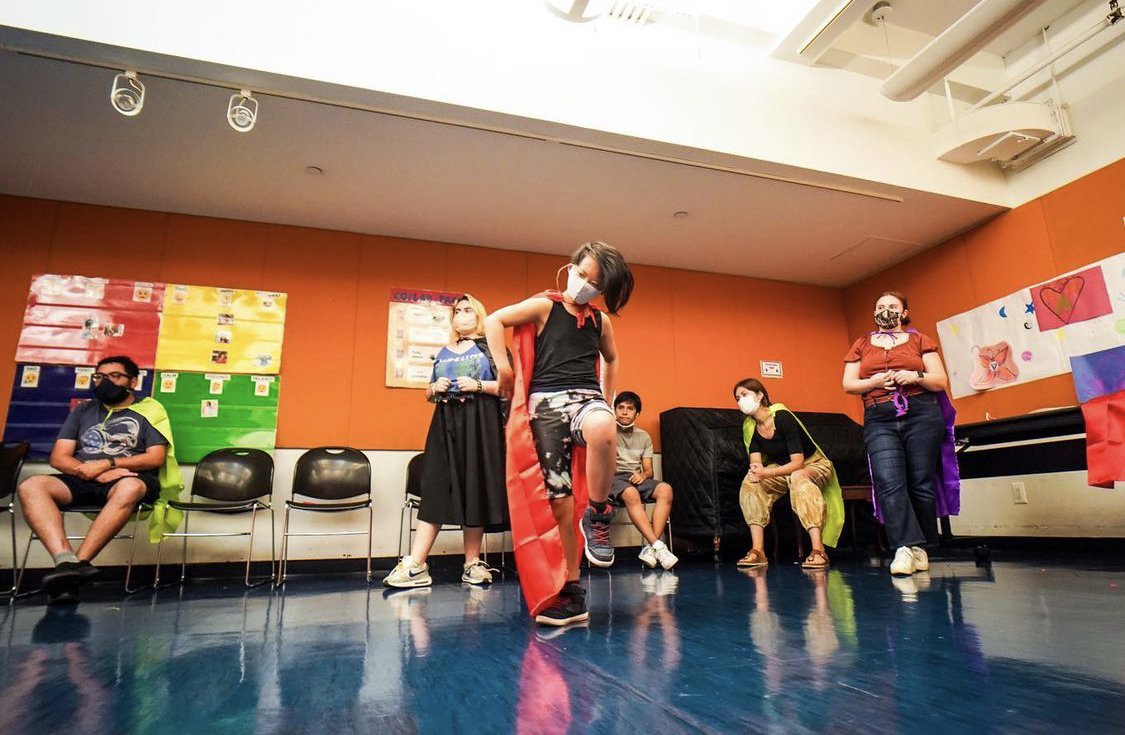What is applied theater?
Applied theater is an umbrella term for various theatrical forms in which audiences engage in and shape narratives that center a liberator practice. It is a field that equally relies on both aesthetic and utility to engage communities to think critically about the world. Applied theater can take place in schools, prisons, community centers, hospitals——any space where people are willing to play and grow together.
Recent teaching artist/applied theater work:
Brooklyn Arts Exchange (BAX) — Group Leader| School Breaks Programs | February, April, July 2024
Created and facilitated original arts education daily programming for 2nd through 5th graders, adapted for differing needs and/or disabilities
Cultivated an inclusive, equity-based culture
Provided direct supervision and mentorship to the counselor staff through delegating tasks, providing feedback, and encouraging their facilitation
Addressed concerns of parents, staff, and children and resolved problems while maintaining confidentiality
Met with administrative staff regularly to discuss program logistics, scheduling changes/flow, staff development, group management, and children’s individual needs
The Silberman School of Social Work, MSW Course: Critical Social Work: Bridging the Micro-Macro Divide with Applied Theatre | Honoraria Teaching Assistant — performed originally devised Theater-in-Education (TIE) social emotional learning (SEL) piece made for middle schoolers about understanding complex emotions (notably loss), then advised and guided graduate students on the creation of their own original applied theater pieces
CO/LAB Summer Camp — worked as a Supporting Artist with nonprofit organization CO/LAB Theater Group (Creative Opportunities without Limits and Boundaries) which offers individuals with developmental disabilities theater arts programming and activities
Come Back Cities at the Queens Museum — co-facilitated theater games for siblings of Deaf-Blind youth as part of a community-building event to support families in the Deaf-Blind community
‘Justopia’ — co-facilitated and acted in the process drama, ‘Justopia’, written by Caitlyn McCain, Audrey Akins, and Leslie Thompson for students of the Stella Adler Conservatory’s Affinity group for BIPOC students. The drama addressed questions pertaining to transformative justice, racism, conflict/harm/repair.
A more in depth look at applied theater…
In 1968, a man wrote a book that was, in every sense of the word, revolutionary. That man was Paulo Freire and his book, Pedagogy of the Oppressed, has impacted thinking and practice around the globe since its publication. Broadly, the text explores the nature of oppression and of freedom.
Freire places education at the source of all liberation, believing that oppressed persons can only be freed of their dehumanized identity (which they inherit and unconsciously subscribe to) through an awakening of critical consciousness.
Freire declares that traditional state-sanctioned teaching methods stunt students’ growth and atrophy their minds, rendering them akin to storage units which must hold onto and return information upon request (termed by Freire as ‘banking education’ ). In turn, his liberatory pedagogy is one in which teachers ask questions that spark students’ critical thinking and call upon their inherent knowledge. The teachers’ primary initiative becomes empowering, expanding, and supporting the students’ innate proclivities, rather than testing their aptitude for memorization. In the process, the teachers mutually learn themselves, as both parties shed their role as automatons upholding an oppressive structure. Together, they become capable of impacting the world through a continuous cycle of contemplation and action (called ‘praxis’ 3). A vertical, power-over structure is dismantled for a horizontal and equalizing exchange.
The traditional theater setting offers a clear analogy to Freire’s classroom. A few years after the publication of Pedagogy of the Oppressed, fellow Brazilian, Augusto Boal, introduced Freire’s paradigm to the theater in writing Theater of the Oppressed—a foundational text (and form) to the field of applied theater at large. Over the following decades, teaching artists, educators, and facilitators have developed applied theater into a robust field of various practices, marked by the humanizing tenets Freire espouses——notably dialogue, equity, play, joy, and radical love.


